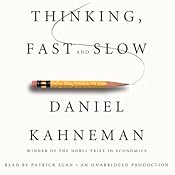Our vote should not be affected by the location of the polling station, for example. But it is. A study of voting patterns in precincts in Arizona in 2000 showed that the support for propositions to increase the funding of schools was significantly greater when the polling station was in a school than when it was in a nearby location [1]. A separate experiment [1] showed that exposing people to images of classrooms and school lockers also increased the tendency of participants to support a school initiative.As far as I can recall, my voting station is always in a local church. Could that be helping our local Conservative politicians? Recall that in 2008, the Liberals lost our riding by a mere 17 votes.
(2:34:36, chapter 4)
[1] J. Berger, M. Meredith, and S. C. Wheeler, "Contextual priming: Where people vote affects how they vote," Proc. of the National Academy of Sciences, vol. 105, no. 26, pp. 8846–8849, Jul. 2008. (link)



